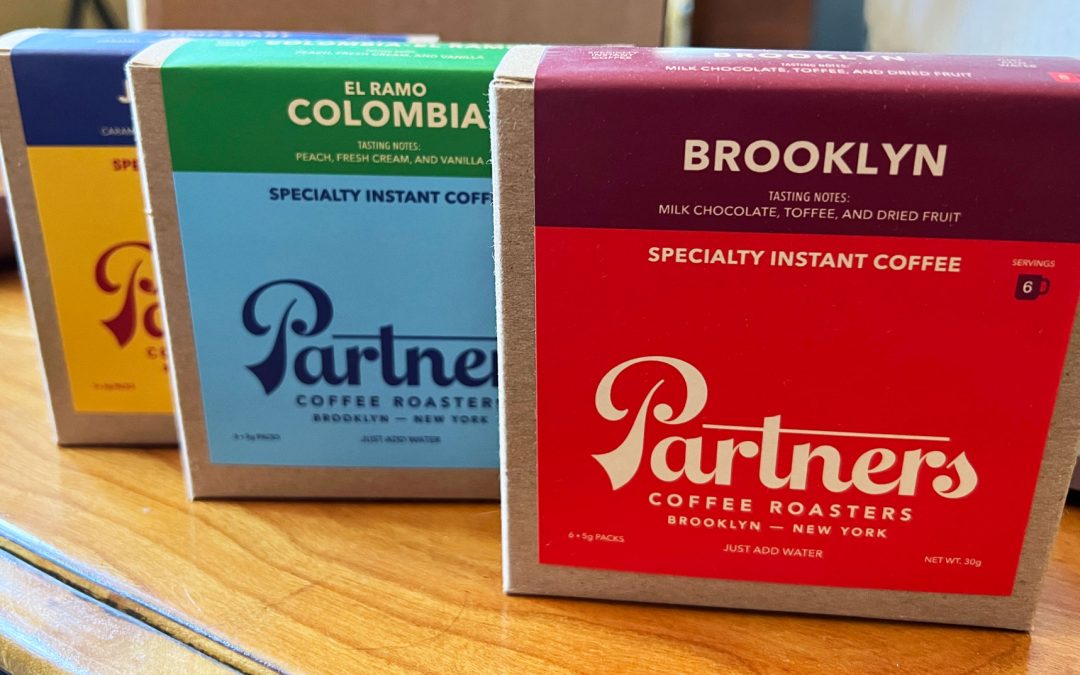Partners Coffee just launched a new line of instant coffee for mail order and delivery, and the five-location coffee shop and roastery has some tips for doing national delivery right.
Partners is a hip, Brooklyn coffee shop with five locations around the New York City area. Inside the company, however, is a sprawling ecommerce operation that plays up the hip brand, sustainable supply chain and small-batch roasting.
The company has been shipping specialty coffee around the country for years and has coffee in grocery stores, as well. As more brands are looking to do mail order operations, the company shared some tips as it launches its line of instant coffee (which is pretty darn good.)
First, like other mail-order upstarts, having a brand that people like going to is critical.
“Being an independent, Brooklyn-based business is a key selling point for our specialty instant coffee. We are producing our instant coffee with the same coffee we sell in our cafes and online,” said Olivia Laskowski, marketing manager at Partners Coffee. “The fact that people who have visited our cafes can now brew a quick cup of our coffee anywhere they go is a huge selling point.”
When COVID hit, New York changed overnight, and having that strong brand meant the company could lean on ecommerce as the typical daily coffee customers and lunchtime crowd disappeared.
“The pandemic has illustrated the importance of a broad audience that isn’t locale-independent. Having a national presence grants us a level of resiliency,” said Andrew Costaris, director of customer experience at the company.
He oversees a lot of the technology across the company, and there are some specialty tools for running a high-volume mail-order business. Costaris said three things have been “integral” to scale up.
“A fulfillment platform is absolutely key. We utilize Shipstation, which operates as our WMS (warehouse management system). It offers powerful workflows that automate a number of our operations and simplifies the picking and packing process. It also offers highly-competitive, negotiated shipping rates,” said Costaris.
Second is a strong ecommerce platform that can scale and flex when needed. Partners gets a lot of business on big sale days like Black Friday, but it needs to be easy enough for in-house teams to manage.
He pointed to platforms like Shopify, Big Commerce or Magento all known more for direct-to-consumer brands and retailers, but they off no- or low-code operations. They’re also designed to be dead simple for customers, integrating easy payment infrastructure, logins and order tracking. There’s not much like it specific to the food industry.
The third key piece is customer interaction. With thousands of orders going out and thousands of questions coming in, Costaris said a scalable tool was necessary.
“Customer support exists at every touchpoint in a customer journey. Having a help desk that can function across multiple channels, and supports complex logic, and internal communication is absolutely essential,” said Costaris.
Beyond the technology, partnerships have been impactful as the line between off-premises and ecommerce blurs.
Partners is a DoorDash-exclusive partner, which offers reduced commissions, some extra marketing support and a higher tier of support from the delivery provider. He said there are some nice perks like the new DoorDash Ship Anywhere and placement in DashMarts to push out more of the company’s coffee.
Partners also offers an affiliate program, so any foodie with a blog or a savvy Internet marketer can push Partners coffee further. That is far across the line between restaurants and ecommerce, but as more food goes online, it’s becoming more common. Several of the big-name mail-order food delivery companies have an affiliate program that reward credits for the company, but the Partners program offers a cut of the sales. After spending so much time and effort scaling the program, he said it started to make sense.
“Over the past few years, we’ve grown our national e-commerce footprint and significantly refined our online user experience and web presence,” said Costaris. “It felt like a logical next step to set up an affiliate program that would support various publishers and partners, but also bolster our goals of driving more folks to our new site to discover our products.”
He said anyone in the food world looking to start their own mail-order business should “start slow” and see what works. Find out what makes customers happy and collect reviews to validate the offering for the next customers. Then figure out how to scale. That part, he said, was more difficult than expanding capacity of the roastery or figuring out how to make instant coffee.
“Manufacturing products can be one of the easier aspects of a DTC business. Shipping and fulfillment are where things get tricky. A lot of our learnings in the last two years have led us to create a system with as little friction as possible,” said Costaris.


